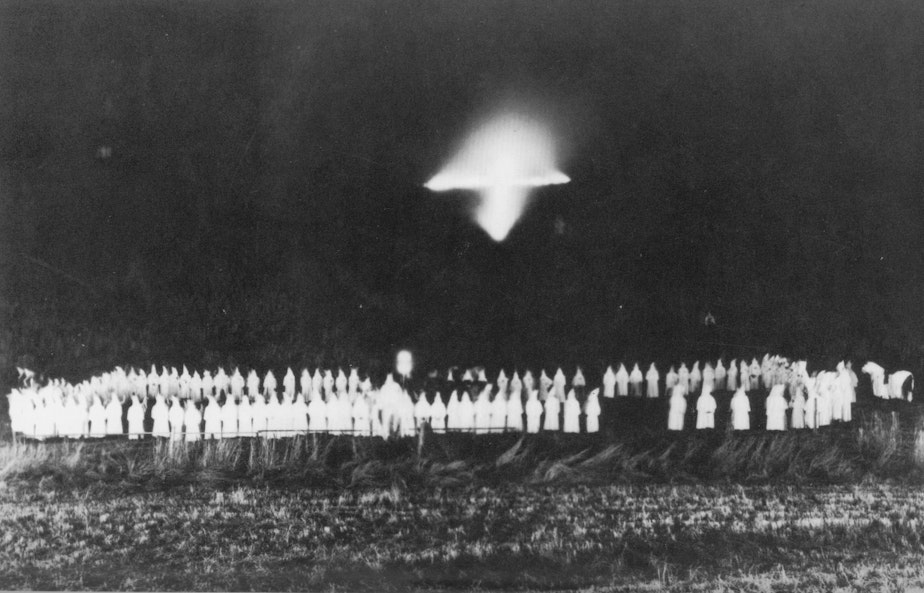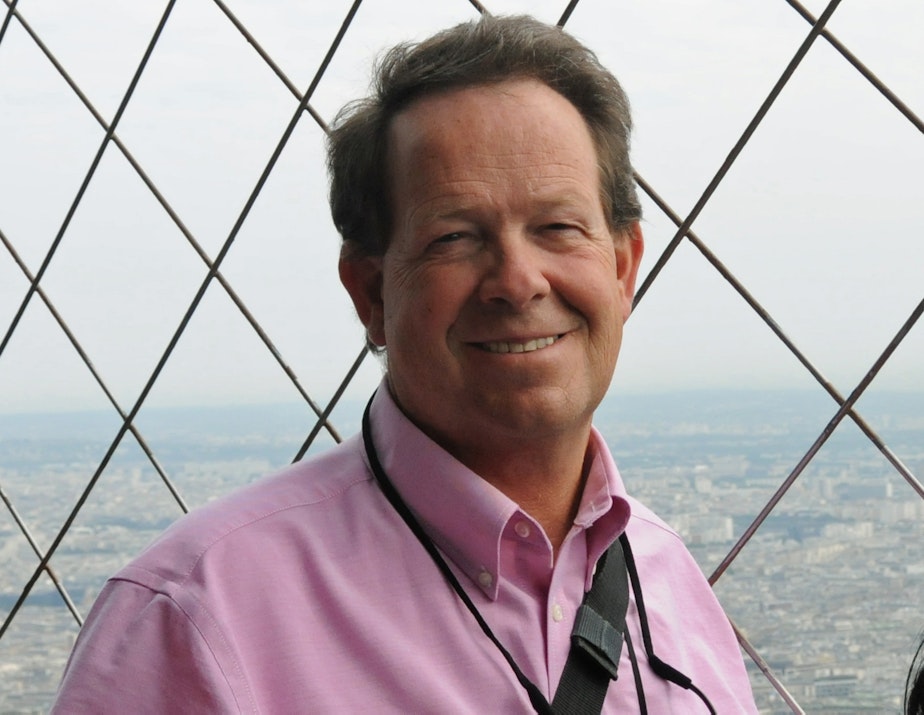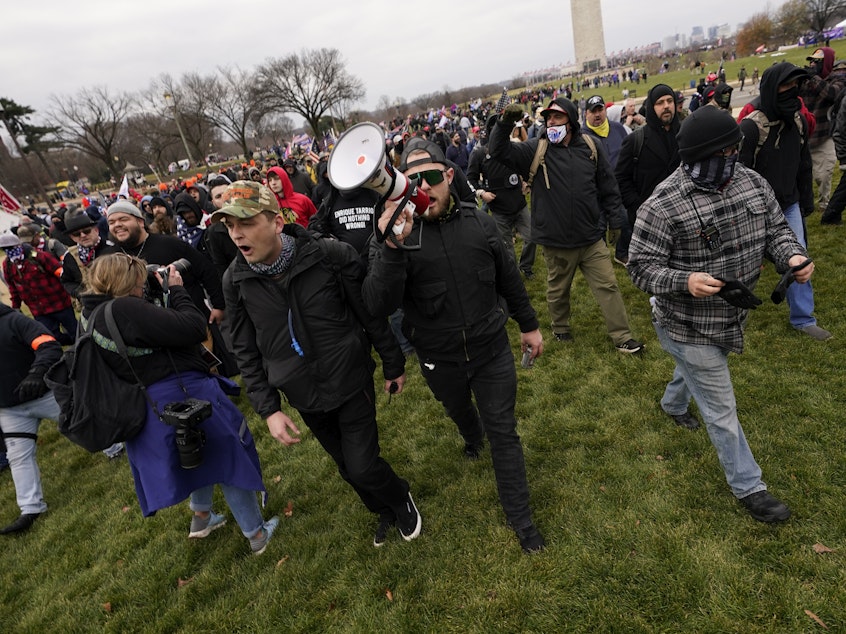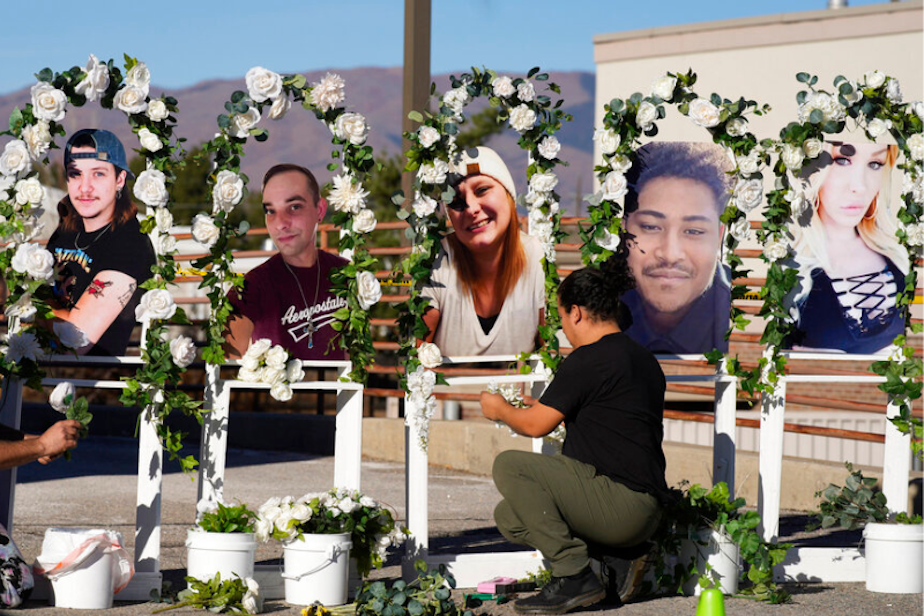How the PNW's history of far-right extremism played a role on Jan. 6

Far-right extremist groups like the Proud Boys and the Oath Keepers may not have been household names prior to Jan. 6, 2021, nor were names like Ethan Nordean, an Auburn-area man who helped lead rioters to storm the U.S. Capitol that day.
The extremist views that were behind the insurrection are not new, though; they have a long history right here in the Pacific Northwest.
David Neiwert, an author and journalist who has covered far-right extremism in the region for more than 40 years, recalls when the neo-Nazi Aryan Nation moved into Idaho. He was the editor of a small newspaper in Sandpoint at the time and found himself contemplating how best to cover the white supremacists in his backyard.
"We came to what we thought was the astute decision: well, we're just not going to cover them because they just want publicity, and we're not going to give it to them," Neiwert said of his reasoning at the time. "We quickly discovered right-wing extremists see silence as tacit acceptance, tacit approval. They see it as a green light."
Neiwert's latest book, "The Age of Insurrection: The Radical Right's Assault on American Democracy," came out Tuesday. In it, Neiwert details the events and influences leading up to the Jan. 6 insurrection. Those events dive in the history of the far-right — its many iterations — in the Northwest and how silence allowed them to flourish.

He spoke to KUOW's Angela King.
Sponsored
"There's a real strong tendency to want to turn our eyes away," he said. "And I gotta tell you: When these folks are dedicated, they never go away. They never stop. They never give up."
That's despite the ramifications a growing number of insurrectionists now face.
Just last week, Daniel Joseph “DJ” Rodriguez from California was sentenced to 12.5 years in prison for using a stun gun on Metropolitan Police Officer Michael Fanone, and Robert Gieswein of Colorado was sentenced to four years in prison for assaulting police with "chemical irritants." Insurrectionists have also been sentenced in Texas, Florida, Michigan, Pennsylvania, and Tennessee this month.
Washingtonian Ethan Nordean has been convicted of seditious conspiracy, among other federal charges, along with four other members of the Proud Boys. Proud Boys national chairman Enrique Tarrio was among them, though Tarrio was arrested two days before the insurrection. That left Nordean to assume "war powers to lead the men on the ground on Jan. 6," as Neiwert describes it in "The Age of Insurrection."
Now, Nordean and his fellow Proud Boys are set to be sentenced in August. They face 20 years in prison on the seditious conspiracy charge alone.
Sponsored
Whether the punishment will deter further violence, though, is yet to be seen.
"Their convictions give the Proud Boys and their supporters another cause to protest and create scenes of violence around, which is what they specialize in," Neiwert said.

Neiwert dubbed the insurrectionists "Trump's Army." Former President Donald Trump proclaimed the 2020 presidential election had been stolen from him and called on his supporters to "fight like hell." He also said he'd march on the Capitol with them, a promise he did not keep.
Nordean heeded his call. Later, after Trump failed to act, Nordean disavowed the former president — but not the extremism that inspired him.
Sponsored
Instead, Nordean called for the Proud Boys to regroup, Neiwert said.
Neiwert paraphrased: "Go back to your local areas, recruit locally, build up your local chapters, and get involved in politics at the local level. Hollow out democracy from the bottom up."
Extremists are doing just that, Neiwert said, in their bigoted attacks on drag queen story times across the country, their false claims that LGBTQ people are "grooming" children, their war on so-called "critical race theory" and the violence they demand in response to these ideas. Through violence, extremists make people less confident in democratic institutions' ability to keep them safe — and that makes them more susceptible to authoritarianism.
"It doesn't take very many to wreak a whole lot of havoc.," Neiwert said. "It only takes one guy with a gun to go to a Buffalo supermarket and gun down 10 people or another guy to take another gun to the mall in Allen, Texas, or a guy with an AR-15 to walk into a gay club in Colorado Springs."
Each of those shooters seem to have been motivated by far-right beliefs. The shooter who attacked a Buffalo supermarket in May 2022 wrote about wanting "to prevent Black people from replacing white people and eliminating the white race." The Allen shooter posted racist and misogynistic screeds online, wore a Right Wing Death Squad patch, and glorified Hitler.
Sponsored
Neiwert said he doesn't believe far-right extremists will succeed in replacing our democracy with authoritarianism. They will try, though, and they will cause harm in the process, he warned.
There's only one way to fight back, he said: "Call it out. Expose it...I always saw standing up to neo-Nazis and extremists, from the time I was a kid, as a matter of common sense. This isn't a matter of political bias. This is basic, common decency."

Some have tried to stand in the way of extremism, but it's evolved over time.
"[Far-right extremism in the region] goes back 100 years. The Ku Klux Klan actually had a major presence here in the Pacific Northwest in the 1920s," Neiwert said. "And in the 1930s, we had the successor to the Klan: ... a sort of fundamentally American fascist group called the Silver Shirts."
Sponsored
The leader of the Silver Shirts, William Dudley Pelley, actually ran for president in 1936 as a third-party candidate under the "Christian Party," which he founded. His platform mimicked that of the Nazi Party. Still, his name appeared on the ballot in Washington state, the only state to include him and where he lived for the duration of his failed campaign.
"But [the far-right] didn't really manifest itself in a significant way until the 1970s, when the Aryan Nation showed up in the Idaho Panhandle and started recruiting people to come to the Pacific Northwest as a white homeland."
That's because the region was and is already very white, Neiwert explained, thanks in large part to how the Pacific Northwest was settled and developed in the 1930s and 1940s. Seattle, for example, has long been shaped by redlining, a discriminatory practice that served to keep people of color and low-income residents out of certain neighborhoods.
The Pacific Northwest is also no stranger to far-right extremist violence.
Neiwert recalled a neo-Nazi "rampage" in 1984. It was perpetrated by a group called The Order led by Robert J. Mathews, who died during a standoff with the FBI on Whidbey Island. White supremacists still gather on the island to commemorate the anniversary of his death.
During their rampage, The Order assassinated radio talk-show host Alan Berg. His murder was depicted in the movie "Talk Radio" and in the book "Talked to Death: The Life and Death of Alan Berg." Neiwert said Berg "pissed off the neo-Nazis because he kept making fun of them on the air." So, they gunned him down.
These days, far-right extremism is easily peddled on social media.
Consider this passage from Neiwert's book "The Age of Insurrection":
"On the right-wing platform Parler, 'civil war' was already a hot topic — and as Trump spoke (on Jan. 6), it intensified. Mentions of the phrase 'civil war' surged to nearly four times the level before it: 'civil war' was used forty times in the hour before 12:15 p.m., when he began speaking; in the hour following, 'civil war' mentions jumped to 156.
When he told the crowd that 'you’ll never take back our country with weakness,' a Parler user responded: 'Time to fight. Civil war is upon us.' Another wrote: 'We are going to have a civil war. Get ready!!'"
That extremist rhetoric represents the "terrible conundrum" we find ourselves in now, Neiwert said.
"I don't think that this is the kind of thing that anybody can compromise or try to find common ground on," he concluded. "Because there's no common ground with these people. So, I think your only option is to play hardball and eventually hope they come around."


